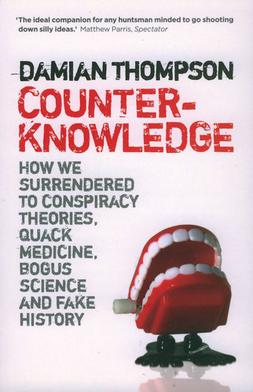Counterknowledge
Counterknowledge is a term used to describe information that is presented as factual and accurate but is actually false or misleading. This type of information often spreads through various media channels and can have significant impacts on public perception and behavior.
Definition[edit | edit source]
Counterknowledge refers to the dissemination of false or misleading information that is presented as fact. This can include pseudoscience, conspiracy theories, urban legends, and other forms of misinformation. Unlike simple errors or mistakes, counterknowledge is often spread intentionally to deceive or manipulate.
Characteristics[edit | edit source]
Counterknowledge typically exhibits several key characteristics:
- **Lack of empirical evidence**: Claims are not supported by reliable scientific data or research.
- **Appeal to emotions**: Information is designed to evoke strong emotional responses rather than rational analysis.
- **Resistance to correction**: Believers in counterknowledge often reject evidence that contradicts their views.
- **Spread through media**: Counterknowledge is frequently disseminated through social media, television, and other forms of mass communication.
Examples[edit | edit source]
Some common examples of counterknowledge include:
- Anti-vaccine movement: The belief that vaccines cause autism and other health issues, despite overwhelming scientific evidence to the contrary.
- Flat Earth theory: The claim that the Earth is flat, which contradicts centuries of astronomical observations and scientific research.
- Climate change denial: The rejection of the scientific consensus on climate change and its human causes.
Impact[edit | edit source]
The spread of counterknowledge can have serious consequences, including:
- **Public health risks**: Misinformation about medical treatments can lead to harmful behaviors, such as refusing vaccinations.
- **Erosion of trust in science**: Persistent counterknowledge can undermine public confidence in scientific institutions and experts.
- **Social division**: Counterknowledge can contribute to polarization and conflict within societies.
Countermeasures[edit | edit source]
Efforts to combat counterknowledge include:
- **Education**: Promoting critical thinking and scientific literacy to help individuals evaluate information more effectively.
- **Fact-checking**: Organizations dedicated to verifying the accuracy of information and debunking false claims.
- **Regulation**: Policies aimed at reducing the spread of misinformation on social media platforms and other media outlets.
See also[edit | edit source]
References[edit | edit source]
External links[edit | edit source]
Search WikiMD
Ad.Tired of being Overweight? Try W8MD's physician weight loss program.
Semaglutide (Ozempic / Wegovy and Tirzepatide (Mounjaro / Zepbound) available.
Advertise on WikiMD
|
WikiMD's Wellness Encyclopedia |
| Let Food Be Thy Medicine Medicine Thy Food - Hippocrates |
Translate this page: - East Asian
中文,
日本,
한국어,
South Asian
हिन्दी,
தமிழ்,
తెలుగు,
Urdu,
ಕನ್ನಡ,
Southeast Asian
Indonesian,
Vietnamese,
Thai,
မြန်မာဘာသာ,
বাংলা
European
español,
Deutsch,
français,
Greek,
português do Brasil,
polski,
română,
русский,
Nederlands,
norsk,
svenska,
suomi,
Italian
Middle Eastern & African
عربى,
Turkish,
Persian,
Hebrew,
Afrikaans,
isiZulu,
Kiswahili,
Other
Bulgarian,
Hungarian,
Czech,
Swedish,
മലയാളം,
मराठी,
ਪੰਜਾਬੀ,
ગુજરાતી,
Portuguese,
Ukrainian
Medical Disclaimer: WikiMD is not a substitute for professional medical advice. The information on WikiMD is provided as an information resource only, may be incorrect, outdated or misleading, and is not to be used or relied on for any diagnostic or treatment purposes. Please consult your health care provider before making any healthcare decisions or for guidance about a specific medical condition. WikiMD expressly disclaims responsibility, and shall have no liability, for any damages, loss, injury, or liability whatsoever suffered as a result of your reliance on the information contained in this site. By visiting this site you agree to the foregoing terms and conditions, which may from time to time be changed or supplemented by WikiMD. If you do not agree to the foregoing terms and conditions, you should not enter or use this site. See full disclaimer.
Credits:Most images are courtesy of Wikimedia commons, and templates Wikipedia, licensed under CC BY SA or similar.
Contributors: Prab R. Tumpati, MD

